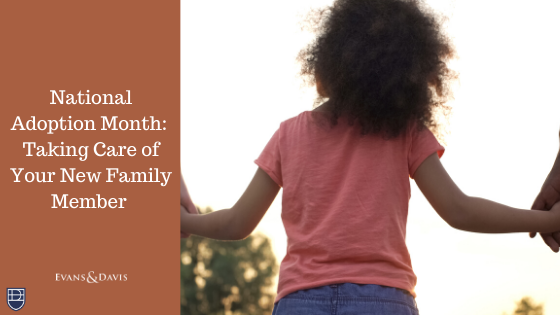
November is National Adoption Month, which is aimed at raising awareness about adoption and the children who need permanent, loving homes. Thousands of children are adopted each year, bringing much joy to their adoptive families. If you are in the process of adopting or have recently adopted a child, it is a great time to create or update your estate plan to ensure that it provides for your new family member in the way you intend.
All Children Are Treated the Same…
Generally, if you are an adoptive parent, adopted children are treated no differently than biological children in your estate planning documents, as well as the estate plans of adoptive grandparents and other family members. If you do not have an estate plan in place, there are several factors to consider when a new child—adopted or biological—comes into your life. Even if you already have an estate plan, it is important to review it to ensure that your wishes for your new child are fully addressed.
● Appoint a guardian. Most adoptions involve minor children. To ensure that your new child will be cared for if something should happen to you, it is important to appoint a guardian, i.e., a caregiver, in your will. Because this person will act as your child’s parent if you become disabled or die, it is important to choose someone who will love the child and is willing and capable of taking care of them in a way that is congruent with your wishes. It is also wise to name an alternative guardian in case the first person becomes unable to care for your child at some point in the future. Be sure to obtain their consent to act in this role. If you fail to designate a guardian, the care of your children will be left in the hands of an individual appointed by a court—who may not be someone you would have chosen. In addition to a permanent guardian to act in case you are disabled or die, it is also important to consider naming a temporary guardian, especially if you travel a lot. A temporary guardian will allow the chosen individual to make decisions for your child on a short-term basis if you are not able to.
● Consider a trust. If you are adopting a minor child, chances are you do not want your child to receive their entire inheritance at 18 years old, should you die before that point. By creating a trust, you can choose a trustee to watch over and use the inheritance for your child’s needs according to your stated wishes. In addition, if your adopted child has any special needs, a special needs trust can be established to provide funds for the child’s care without making the child ineligible for government benefits.
● Make sure property and money are distributed as intended. Particularly if you have decided to adopt as an older parent and already have children, it is important to carefully consider what you would like each child to receive and to make any necessary adjustments to your estate plan. For example, if you have previously established an irrevocable trust—a type of trust that could be quite difficult or impossible to modify—which names your older children as beneficiaries, you may want to make other arrangements to provide equivalent benefits for your newly adopted child. Or, if your older children are already very financially secure, but your new child will be dependent upon you for many years to come and may need funds to pay for a college education, you can make adjustments to your will or trust to provide for any additional amounts that will be needed for your younger child. Also, a grandchild who is adopted by a grandparent legally becomes the child of the grandparent, but the grandparent may want to continue to treat the child as grandchild rather than a child for estate planning purposes.
Warning: If you do not include your adopted child in your will or trust—either by naming the child specifically or by making provisions using a class gift (e.g., by giving an equal share to “all my children”), state law will determine how much the child will inherit, which may not reflect your wishes.
Sometimes Additional Factors Need to Be Considered
Although an adopted child is typically treated the same as a biological child in an estate plan, under certain circumstances, there may be special considerations you should keep in mind.
● Consider planning before the adoption is finalized. If your adoption is not yet final, but you love the child you intend to adopt and want to provide for him or her, you need to specifically name the child in your estate planning documents. If you do not, the child may not be entitled to receive any of your assets if you pass away before the adoption is final.
● Think about the effects of a stepparent adoption on your planning. Stepparents who help raise a spouse’s child, but do not adopt the child, do not have legal ties to the child that would entitle the child to inherit from them. If the stepparent’s will or trust merely provides that “all the children” will receive an equal share, the stepchild will not receive anything. However, if you adopt your stepchild, the child will generally be treated, under the law, the same as your biological child for inheritance purposes. The effects of a stepparent adoption on the stepchild’s right to inherit from the non-custodial birth parent vary by state. In most states, when a stepparent adopts a spouse’s child, the child’s legal ties to the non-custodial birth parent are cut, and the child will no longer be able to inherit from that birth parent unless the child is expressly included in his or her will. In some states, however, a child’s adoption by a stepparent will not end the child’s legal right to inherit from the birth parent and—if the birth parent’s parental rights were never terminated—from other biological relatives.
● Second parent adoption. Stepparent adoption is available in all 50 states to married couples, and in states that recognize a civil union or registered domestic partners. In some states, individuals who are part of a couple but not in a legally recognized relationship such as a marriage or civil union, including those in same-sex relationships, can adopt a child who is the biological or adopted child of their partner without terminating the parental rights of the “first” parent by using a second parent adoption under that state’s law. As is the case with stepparent adoptions, a child adopted through a second parent adoption will be treated the same as a biological child in your estate planning.
● Biological family. If possible, members of the child’s biological family should be made aware of the legal effects of the adoption so that they can make a specific provision for the child in their estate plan if they still want the child to inherit property or money from them.
● Make sure an international adoption is legally recognized. When you adopt a child from another country, it is important to ensure that the adoption is recognized not only by your state, but by other states as well. Not all foreign adoptions are finalized in the child’s country of origin, so it is important to finalize those adoptions in the United States. Even if an adoption is finalized in another country, not all states recognize those adoptions. A readoption, which is a review of the international adoption by a state court, will ensure that the adoption is not vulnerable to a challenge in a U.S. court if you move to a state that does not recognize foreign adoptions. This step will also ensure your adopted child is legally entitled to inherit from you. As mentioned above, you should include the child in your will or trust to ensure that the child receives the economic benefits and protections you desire—not just those specified by state law.
● Be aware of special rules for adult adoptions. Sometimes, people decide to adopt an adult to formalize a special relationship or to care for someone who is disabled. It can also be used to establish inheritance rights, for example, in a situation in which a childless person’s share of the property in a trust created by his or her parents will go to a sibling or the sibling’s children if that person passes away without a child. The childless person could adopt a close friend so that his or her portion of the trust property will go to the friend instead of following the default path set out in the trust. State law varies regarding adult adoptions: Some states only require the voluntary consent of the adult person who is being adopted, but others have more restrictive requirements.
Celebrate Your New Arrival by Planning for the Future
Choosing to share your life with a child is a wonderful thing! Whether you have just adopted a child or adopted years ago, it is crucial to ensure that your estate planning documents indicate the money and property you would like your child to receive, when they should receive it, and indicate who you want to act as a caregiver for your child if something should happen to you. Please call us to set up an appointment so we can help you create an estate plan that best addresses your growing family’s unique needs.


